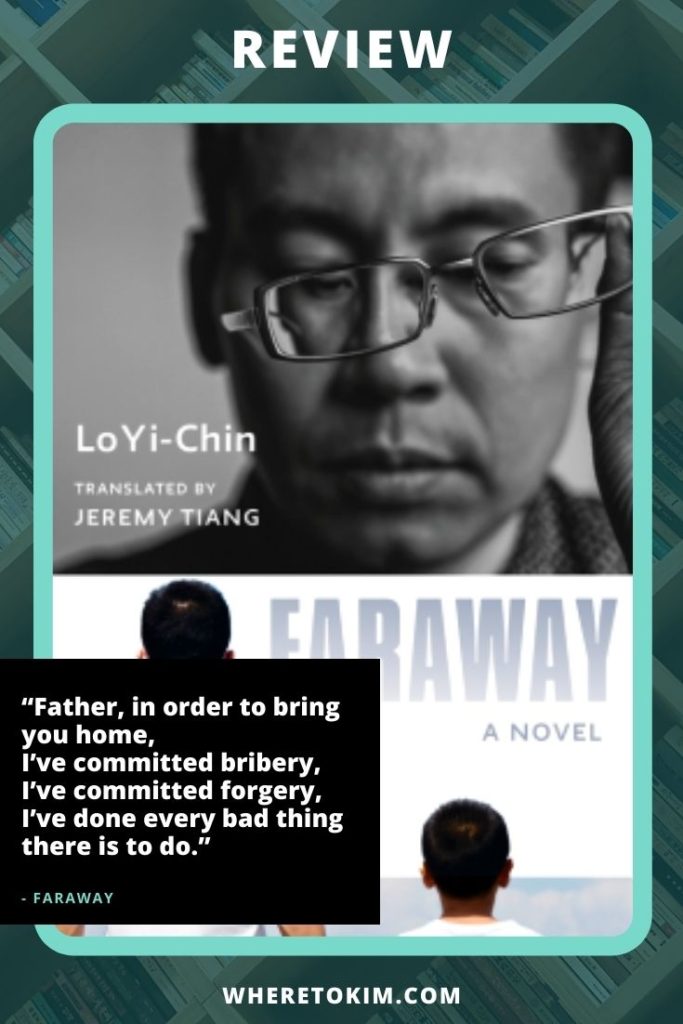Faraway by Lo Yi-Chin depicts the complicated relationship between a father and a son through the latter’s Kafkaesque experience in a foreign hospital.
Location: Jiujiang in mainland China and Hualien and Taipei in Taiwan
Faraway synopsis
In Taiwanese writer Lo Yi-Chin’s Faraway, a fictionalized version of the author finds himself stranded in mainland China attempting to bring his comatose father home. Lo’s father had fled decades ago, abandoning his first family to start a new life in Taiwan. After travel between the two countries becomes politically possible, he returns to visit the son he left behind, only to suffer a stroke. The middle-aged protagonist ventures to China, where he embarks on a protracted struggle with the byzantine hospital regulations while dealing with relatives he barely knows. Meanwhile, back in Taiwan, his wife is about to give birth to their second child. Isolated in a foreign country, Lo mulls over his life, dwelling on his difficult relationship with his father and how becoming a father himself has changed him.
Faraway is a powerful meditation on the nature of family and the many ways blood can both unite and divide us. Lo brings a keen sense of irony and sensitivity to everyday absurdity to his depiction of both family dynamics and fraught politics. He offers a deft portrayal of the rift between China and Taiwan through an intimate view of a father-son relationship that bridges this divide.
Book review
The death of an elderly person makes you mourn the entire landscape of a life, whereas with the death of a child it is the innocence that makes you sad. There is no backup for life, when the screening is over you’ve finished the very last reel.
In a dream, a street corner in a nonexistent city represents the suffering and entrapment of the main character’s father. He is unsure how to assume the father role in front of his child, having abandoned his comatose father in a ward.
Abandonment is one of the main themes in Faraway. The author writes about how his father abandoned his family and he himself daydreams about being capable of leaving his father and son (even leaving his two-year-old child alone in a hot car). The complicated and strained relationship with his father is further illustrated by the level of (naked) intimacy when taking care of his father and scenes such as the one in the bathtub when he was a child.
Farce
Faraway is a story about something you never want to experience: bringing home a loved one who has been hospitalized in a foreign country. You read how the author deals with the local customs to make sure everything goes smoothly. There is no way to know if he is handling it the right way.
Lo Yi-Chin tells of a terrible situation, which could come across as comical if it were not true. He and his family had everything against them in an unfamiliar environment. No help from the home front or great support from organizations that were supposed to help him. He felt trapped in that backward and impoverished city because of an old man’s ruined body and tried daily with all his might to get out of there.
In this story, he also gives his views on immigration and relations between Taiwan and mainland China, and gives the reader a glimpse into Taiwanese culture.
Disorderly scrawl
“My notes were a disorderly scrawl, like the hysterical, melancholy journal entries of a manic patient unable to let go of insignificant details. A thought floated into my brain: when all this was over, I would gather my memories and reconstruct this journal (this city, this hotel) as if it were a novel.”
I guess the level of detail and disorder in the book was intentional. The main character often reminisces about things that are not directly relevant to the storyline, such as when he lists all the items on the receipts he kept. Although I don’t like his detailed writing style – a matter of personal taste – he wrote many interesting sentences that made me think. I thought about what his words mean to me and what they mean to him. I think there is a difference.
Toward the end of the book, I thought Lo Yi-Chin was mocking my lack of appreciation for detail with a story about his writing classes. By revisiting the same part of the story (e.g., checking into his hotel) many times in different chapters, he does emphasize that it took a long time and that he performed the same actions every day during that time.
Expressing himself
Some lines are beautiful, others are thoughtful and confrontational, hiding nothing. Lo Yi-Chin likes to throw things at you to shock you, while also trying to cover up some of the frustrating events by providing comic relief. He calls it a Kafkaesque experience. Faraway is partly autofiction and the lines between life and fiction, history and imagination are blurry, as Jeremy Tiang mentions in his Translator’s Notes.
The narrator’s scattered thoughts and weary dreams show how strongly the situation affects him. Suddenly, in the middle of a conversation about his family in China, he would throw in information about his father’s suffering with full details about needle marks, excretion and affected body parts. And immediately after expressing his appreciation for Third Brother’s role as guardian angel, he continues as follows: “The hollow feeling of a human being so easily replaced by insignificant objects seemed like a metaphor for Third Brother’s migration story.”
As smoothly as that, dreamy and thoughtful thoughts turn into snide and hurt thoughts from a man who doesn’t know what to feel at that moment. The author skillfully expresses his own powerlessness that extends to his role toward his wife and child. His comical comments about the situation in the hospital (its sad state and quality) cannot disguise the mess and helplessness he feels.
Conclusion
I was very interested in reading about his experience with the hospital and procedures in a foreign country, and eagerly absorbed every comment that related to the narrator’s complicated relationships with his father and son.
I gave Faraway three stars because I’m not a fan of books with lots of detailed recollections and elaborations that take me away from the main storyline. You could argue that these side-steps were important to portray the right atmosphere, but I don’t think that’s true for all of them. While some pages encaptivated me, others did not. However, I am sure that Lo Yi-Chin’s writing style will appeal to many.
Interested?
Get your copy of Faraway from Amazon (available 7 September 2021).
Book details
Title: Faraway
Author: Lo Yi-Chin
Translator: Jeremy Tiang
Language: English
Publisher: Columbia University Press
Pages: 328
ISBN (13): 9780231193955
Publication date: 7 September 2021
About the author and translator
Lo Yi-Chin is an acclaimed Taiwanese writer, the recipient of numerous honors including the Hong Lou Meng Award and Taiwan Literary Award. His novels include Kuang Chaoren, Daughter, Western Xia Hotel, Surname of the Moon, and The Third Dancer.
Jeremy Tiang has translated works by writers including Yeng Pway Ngon, Su Wei-Chen, Yan Ge, Zhang Yueran, Chan Ho-Kei, and Li Er. He is the author of the short story collection It Never Rains on National Day (2015) and the novel State of Emergency (2017).
Many thanks to Columbia University Press and NetGalley for a digital ARC of this novel in exchange for an honest review.







